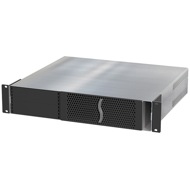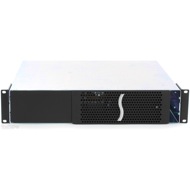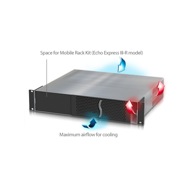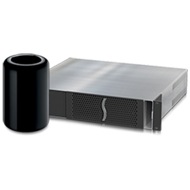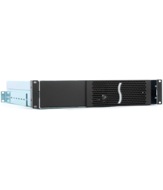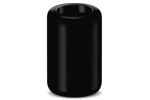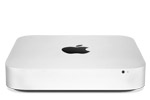Sonnet Technologies
Echo Express III-R
Thunderbolt 2 Expansion Chassis
Mac | PC | Thunderbolt | PCIe
Use PCIe Expansion Cards(1) with Computers Lacking Slots
Today's ultra-light notebooks, mini, and all-in-one desktop computers now have tremendous processing power-power that many thought would only be possible in full-size workstation or large desktop computers. Smaller in size and more portable, they're very desirable. For pros in the creative fields, processing power alone is not enough. A prime example is the new Mac Pro. Proven to be a processing powerhouse and packed with Thunderbolt 2 and USB 3.0 ports, it lacks the PCIe expansion slots necessary to install specialty cards to connect various video and audio inputs, for transcoding data, and to connect to high-speed storage and networks. With the Echo Express III-R, Sonnet has created a solution that leverages the paradigm shift enabled by Thunderbolt technology, allowing PCIe expansion slots to be connected outside a computer. This rackmount Thunderbolt-to-PCIe card expansion chassis makes it possible for you to connect three professional video capture, audio interface, SAS or SATA HBA, 16Gb or 8Gb Fibre Channel, 10 Gigabit Ethernet, and RAID controller PCIe cards to any Mac® with a Thunderbolt port.
Featuring 20Gbps Thunderbolt 2 technology that provides sufficient bandwidth to support many of the highest performance and most demanding PCIe cards, the Echo Express III-R delivers maximum performance when connected to a computer with Thunderbolt 2. The III-R is also fully compatible with computers with 10Gbps Thunderbolt technology, supporting the majority of cards at full-performance.
Three Slots, No Compromise
Sonnet's Echo Express III-R supports three full-size PCIe cards, up to 12.28" (full-length). The III-R integrates a universal 300W power supply and includes a 75W PCIe power connector for cards that require supplementary power, such as the Avid® Pro Tools|HDX or the new RED® ROCKET-X. Even with all that power, the III-R is enviro-friendly; it automatically powers on or off whenever the connected computer powers on or wakes, or powers off or sleeps, respectively. The use of large, slow-spinning fans in the Echo Express III-R makes it a remarkably quiet operator. Two Thunderbolt ports support daisy chaining of up to six devices to a single port on your computer.
Built for Speed
20Gbps Thunderbolt 2 technology-equipped computers are here. The original 10Gbps Thunderbolt interface provided breakthrough bandwidth for external expansion, more than sufficient to support the maximum performance of most PCIe cards. However, some high bandwidth cards such as the RED ROCKETs, 16Gb Fibre Channel, multi-port 10Gigabit Ethernet cards, or the use of other bandwidth-hungry cards require more than 10Gbps. Thunderbolt 2 removes this barrier by providing more bandwidth for demanding applications. The Echo Express III-R's Thunderbolt 2 interface takes full advantage of this increased bandwidth to ensure optimum performance from installed cards when the chassis is connected to a Thunderbolt 2-equipped computer. Need to connect to a computer equipped with 10Gbps Thunderbolt? No problem, the Echo Express III-R is fully compatible with earlier generation Thunderbolt computers as well.
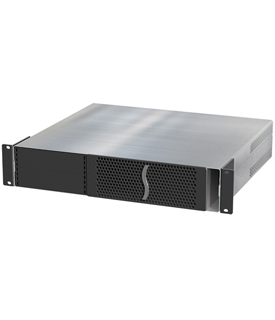
Highlights
- Use PCIe Expansion Cards with Computers Lacking Slots—Use high-performance PCIe cards with any Mac with a Thunderbolt port
- Thunderbolt 2 Interface—Maximum performance with computers with Thunderbolt 2 technology, backward compatible with host computers and other devices equipped with 10Gbps Thunderbolt technology.
- Three PCIe Slots—Supports three full-length, full-height, single-width cards, or one double-width card plus one single-width card
- Remarkably Quiet—Large, temperature-controlled, variable-speed fans that automatically cool the cards, plus computer-modeled design that reduces airflow turbulence and velocity, combine to provide quieter cooling for all cards
- Integrated Universal Power Supply—Built-in 300W power supply with 75W auxiliary power connector
- Rugged Aluminum Housing—Provides robust and secure protection for any environment
- Every Thunderbolt-Compatible Card Supported—Works with every Thunderbolt-compatible PCIe card, regardless of length or height.
- Sonnet Technology 5 Year Limited Warranty
Smart Design Inside and Out
Constructed of heavy-duty steel, the Echo Express III-R's enclosure not only provides secure mounting for the inner assembly and protection for the PCIe cards installed inside, but it supports maximum airflow for cooling, regardless of where it is installed in a rack. The fans are variable-speed and temperature-controlled, and the computer-modeled airflow management ensures that even hot-running cards and the chassis' components remain reliably cool without the need to install an extra PCIe blower card that would prevent the use of one of the three slots. Because the fans automatically speed up and slow down as needed, there is no guesswork in setting a switch position, and no need for tools to change fan speed settings. Since Echo Express products automatically power on and off with your computer, there is no power switch needed on the chassis. The III-R includes adjustable and removable rackmount extension rails that allow the chassis to be installed securely in a variety of racks from 16" to 24" deep. The III-R provides space for other equipment, too. Utilizing the optional Echo Express III-R Mobile Rack Kit, you can install two 5.25-inch form factor mobile rack devices (sold separately) in the III-R's enclosure without taking up additional rack space.
Quiet, Please
The Echo Express III-R was designed to be remarkably quiet so that it can be comfortably used in noise-sensitive environments, and it is indeed the quietest Echo chassis yet. Its dual, ultra-quiet, temperature-controlled fans assist the natural convection of warm air through the PCIe cards. Echo Express III-R's fans vent warm air through custom Venturi openings with low form-drag grills, resulting in reduced air velocity, turbulence, and, consequently, fan noise.
Every Thunderbolt-Compatible Card Supported
The Echo Express III-R supports three standard-width, full-length PCIe cards, or one double-width, full-length card plus one single-width card, enabling it to support every Thunderbolt-compatible card available. PCIe 1.1, PCIe 2.0, and PCIe 3.0 cards are supported. Do you have a card in mind but aren't sure it's compatible? Check the
PCIe Card Thunderbolt Compatibility Chart. The chart provides an up-to-date list of cards that have been tested to be recognized over a Thunderbolt connection and compatible with Thunderbolt technology requirements.
RED ROCKET Supporter
If you're a RED ROCKET user, you already know that the card normally takes two PCIe slots—one for the card itself and another for the BNC connector bracket (for HD-SDI output). Sonnet designed the Echo Express III-R to accommodate the card/bracket pair in a single slot. This Echo chassis includes mounting holes designed specifically for the installation of two BNC connectors, enabling you to install the ROCKET card in one slot and its BNC connectors in the Echo chassis' mounting holes, leaving the two remaining slots open. The extra bandwidth afforded by the Thunderbolt 2 interface doubles ROCKET's throughput, too.
Thunderbolt Cable Lock Included
Sonnet includes a lock that secures Thunderbolt connectors(3) plugged into the Echo chassis. It is easy to install and prevents accidental cable disconnections.
Rackmount Version Available
The Echo Express III is available in two versions, the
Echo Express III-D (desktop) and Echo Express III-R (rackmount), to suit your workflow needs. The III-R's form factor makes it easy to transport. The III-R mounts in a rack space 2U tall, and is just 16" deep, making it perfect for use in a wide range of popular mobile racks, carts, and rack cases, and server rooms as well.
Product Specifications:
Manufacturer Part Number
Interface
- Two Thunderbolt
- One x8 mechanical (x8 electrical) PCIe 2.0
- One x16 mechanical (x8 electrical) PCIe 2.0
- One x8 mechanical (x4 electrical) PCIe 2.0
Bus Interface
System Requirements
- Any Mac with a Thunderbolt or Thunderbolt 2 port
- Any Windows® 8 or 7 computer with a Thunderbolt or Thunderbolt 2 port(4)
- Thunderbolt cable (sold separately)
PCIe Cards Supported
- One full length, full-height, double-width PCIe card, plus one single-width card
or
- Three full length, full-height, single-width PCIe cards
* Compatibility requires the installation of Thunderbolt technology-aware drivers, available from the manufacturer. Current available cards from OWC.
Power Supply
- Universal 300W, 115-230V AC, 50-60 Hz
RoHS Compliant
Operating Temperature
- 0° C to 35° C (32° F to 95° F)
Weight
Dimensions
- 19 x 16 x 3.48 in. (48.26 x 40.6 x 8.85 cm)
Warranty
- PCIe cards sold separately; requires Thunderbolt cable.
- Compatibility requires the installation of Thunderbolt technology-aware PCIe cards.
- Thunderbolt cable lock not compatible with optical Thunderbolt cables.
- Windows requires a Thunderbolt 2 interface in the computer and in the expansion chassis to support more than two PCIe controllers. Note that some PCIe cards have a bridge to multiple controllers, so it is possible for a single dual-controller PCIe card to reach the limit if not connected via Thunderbolt 2. Not all Mac-compatible PCIe cards are also compatible with Windows. See the PCIe Card Thunderbolt Compatibility Chart for details.
Manufacturer provided specifications for Sonnet Technologies p/n ECHO-EXP3FR UPC#: 732311009990
Mac Pro
(December, 2013)
Model ID: MacPro6,1
2.7GHz 3.0GHz, 3.5GHz, 3.7GHz
iMac w/Retina 5K display
(27-inch Mid 2015)
(May 2015)
Model ID: iMac15,1
3.3GHz i5, 3.5GHz i5, 4.0GHz i7
iMac w/Retina 5K display
(27-inch Late 2014)
(October 2014)
Model ID: iMac15,1
3.5GHz i5, 4.0GHz i7
iMac (27-inch Late 2013)
(September 2013)
Model ID: iMac14,2
3.2GHz i5, 3.4GHz i5, 3.5GHz i7
iMac (27-inch Late 2012)
(October 2012)
Model ID: iMac13,2
2.9GHz i5, 3.2GHz i5, 3.4GHz i7
iMac (27-inch Mid 2011)
(May 2011)
Model ID: iMac12,2
2.7GHz i5, 3.1GHz i5, 3.4GHz i7
iMac (21.5-inch Mid 2014)
(June 2014)
Model ID: iMac14,4
1.4GHz i5
iMac (21.5-inch Late 2013)
(September 2013)
Model ID: iMac14,3
2.9GHz i5 or 3.1GHz i7
iMac (21.5-inch Late 2013)
(September 2013)
Model ID: iMac14,1
2.7GHz i5
iMac (21.5-inch Early 2013)
(March 2013)
Model ID: iMac13,1
3.3GHz i3
iMac (21.5-inch Late 2012)
(October 2012)
Model ID: iMac13,1
2.7GHz i5 , 2.9GHz i5, 3.1GHz i7
iMac (21.5-inch Late 2011)
(August 2011)
Model ID: iMac12,1
3.1GHz i3
iMac (21.5-inch Mid 2011)
(May 2011)
Model ID: iMac12,1
2.5GHz i5 , 2.7GHz i5, 2.8GHz i7
Mac mini (Late 2014)
(October, 2014)
Model ID: Macmini7,1
1.4GHz, 2.6GHz, 2.8GHz, 3.0GHz
Mac mini (Late 2012)
(October, 2012)
Model ID: Macmini6,1 & Macmini6,2
2.3GHz, 2.5GHz, 2.6GHz
Mac mini (Late 2012 Server)
(October, 2012)
Model ID: Macmini6,2
2.3GHz, 2.6GHz
Mac mini (Mid 2011)
(July, 2011)
Model ID: Macmini5,1 & Macmini5,2
2.3GHz, 2.5GHz, 2.7GHz
Mac mini (Mid 2011 Server)
(July, 2011)
Model ID: Macmini5,3
2.0GHz
MacBook Pro (15-inch Retina display Mid 2015)
(May, 2015)
Model ID: MacBookPro11,4; MacBookPro11,5
2.2GHz, 2.5GHz, 2.8GHz
MacBook Pro (13-inch Retina display Early 2015)
(March, 2015)
Model ID: MacBookPro12,1
2.7GHz, 2.9GHz, 3.1GHz
MacBook Pro (13-inch Retina Display 2013 - 2014)
(October, 2013 - July, 2014)
Model ID: MacBookPro11,1
2.4GHz, 2.6GHz, 2.8GHz, 2.9GHz, 3.0GHz
MacBook Pro (15-inch Retina Display 2013 - 2014)
(October, 2013 - July, 2014)
Model ID: MacBookPro11,2
2.0GHz, 2.2GHz, 2.5GHz, 2.8GHz
MacBook Pro (15-inch Retina Display 2013 - 2014)
(October, 2013 - July, 2014)
Model ID: MacBookPro11,3
2.3GHz, 2.5GHz, 2.6GHz, 2.8GHz
MacBook Pro (15-inch Retina Display 2013)
(January, 2013)
Model ID: MacBookPro10,1
2.4GHz, 2.7GHz, 2.8GHz
MacBook Pro (13-inch Retina Display 2013)
(January, 2013)
Model ID: MacBookPro10,2
2.5GHz, 2.6GHz, 2.9GHz, 3.0GHz
MacBook Pro (13-inch Retina Display 2012-2013)
(October, 2012)
Model ID: MacBookPro10,2
2.5GHz, 2.9GHz
MacBook Pro (15-inch Retina Display 2012)
(June, 2012)
Model ID: MacBookPro10,1
2.3GHz, 2.6GHz, 2.7GHz
MacBook Pro (15-inch 2012)
(June, 2012)
Model ID: MacBookPro9,1
2.3GHz, 2.6GHz, 2.7GHz
MacBook Pro (13-inch 2012)
(June, 2012)
Model ID: MacBookPro9,2
2.5GHz, 2.9GHz
MacBook Pro (17-inch 2011)
(October, 2011)
Model ID: MacBookPro8,3
2.4GHz, 2.5GHz
MacBook Pro (15-inch 2011)
(October, 2011)
Model ID: MacBookPro8,2
2.2GHz, 2.4GHz, 2.5GHz
MacBook Pro (13-inch 2011)
(October, 2011)
Model ID: MacBookPro8,1
2.4GHz, 2.8GHz
MacBook Pro (17-inch Early 2011)
(February, 2011)
Model ID: MacBookPro8,3
2.2GHz, 2.3GHz
MacBook Pro (15-inch Early 2011)
(February, 2011)
Model ID: MacBookPro8,2
2.0GHz, 2.2GHz, 2.3GHz
MacBook Pro (15-inch Early 2011)
(February, 2011)
Model ID: MacBookPro8,2
2.0GHz, 2.2GHz, 2.3GHz
MacBook Air (13-inch Mid 2017)
(June 2017)
Model ID: MacBookAir7,2
1.8GHz i5, 2.2GHz i7
MacBook Air (13-inch Early 2015)
(March 2015)
Model ID: MacBookAir7,2
1.6GHz i5, 2.2GHz i7
MacBook Air (11-inch Early 2015)
(March 2015)
Model ID: MacBookAir7,1
1.6GHz i5, 2.2GHz i7
MacBook Air (13-inch Mid 2013)
(June, 2013)
Model ID: MacBookAir6,2
1.3GHz, 1.7GHz
MacBook Air (11-inch Mid 2013)
(June, 2013)
Model ID: MacBookAir6,1
1.3GHz, 1.7GHz
MacBook Air (13-inch Mid 2012)
(June, 2012)
Model ID: MacBookAir5,2
1.8GHz, 2.0GHz
MacBook Air (11-inch Mid 2012)
(June, 2012)
Model ID: MacBookAir5,1
1.7GHz, 2.0GHz
MacBook Air (13-inch Mid 2011)
(July, 2011)
Model ID: MacBookAir4,2
1.7GHz, 1.8GHz
MacBook Air (11-inch Mid 2011)
(July, 2011)
Model ID: MacBookAir4,1
1.6GHz, 1.8GHz
1-800-275-4576




